Bryan Williams Bible Study Collection (21 vols.)
Digital Logos Edition
Overview
The 21-volume Bryan Williams Bible Study Collection is designed to stimulate and enrich your study of the New Testament with concise and accessible introductions. For years, Dr. Williams has been working to improve biblical literacy, spur discussion and reflection on the Bible, and get people deeper into Scripture in their own personal study or in the context of group study. These books represent the fruit of decades of pastoral ministry and scholarly work on the New Testament, and unlike most Bible studies, these include all the answers to all the questions.
Each book in the Bryan Williams Bible Study Collection begins with introductory material that relates either to a significant background issue concerning the Bible book, or to a topic suggested by the passage. The main part of the study consists of a number of thought-provoking questions for prayerful consideration, reflection, or discussion. Every individual study also contains a short essay which explains the background and purpose of the passage.
The Bryan Williams Bible Study Collection is uniquely suited for Bible study, because much of the content of these books was written from the context of group study. These studies contain thought-provoking discussion and reflection materials, complete with answer keys. Not only do these books help you dig deep into the Word, but they also contain the tools and resources to help you apply the Bible to the vitally important issues of Christian living today. These studies were written with groups in mind, but will prove spiritually refreshing and practically helpful for individual study and sermon preparation as well.
Logos is dedicated to developing the most advanced tools for studying God’s Word. With the Logos edition of the Bryan Williams Bible Study Collection, you can experience the rich wisdom in this collection with the great features of the Libronix digital library, such as extensive tagging and linking, advanced search functionality, and passage guides and reports. That makes the Bryan Williams Bible Study Collection perfect for individual or group study of the Bible, and ideal for Bible study group leaders.

Key Features
- Introductions to the section of the Bible covered
- Background information on the text and extensive contextual data
- Thought-provoking questions for individual reflection or group discussion
- All Scripture references linked to the Bibles in your digital library (that you own)
Product Details
- Title: Bryan Williams Bible Study Collection (21 vols.)
- Author: Bryan Williams
- Publisher: Logos Bible Software
- Volumes: 21
- Pages: 1,122
Individual Titles
- Living For God: Studies in the Book of James
- The Gospel of God: Studies in the Book of Romans
- The Call of the King: The Words of Jesus in the Gospel of Matthew
- The Last Priest: Bible Studies in the Book of Hebrews
- The Fisherman’s Master: Bible Studies in 1 and 2 Peter
- The Servant King: Bible Studies in the Gospel of Mark
- The Curtain Lifted: Bible Studies in the Gospel of John Chapters 12 to 17
- The Unconquerable Lamb: Studies in the Book of Revelation
- Finally Joy: Bible Studies in Paul’s Second Letter to the Corinthians
- The Cheerful Church: Bible Studies in Acts 16 and Philippians
- The Doctor’s Account: Bible Studies in Luke’s Gospel, Chapters 1, 2, 4, 7, 10 to 18 and 24
- Divine Strategy: Bible Studies Based on Acts Chapters 1–12
- Strategic Advance: Bible Studies in Acts Chapters 13 to 28
- The Real Christ: Bible Studies in 1, 2 and 3 John
- Before Abraham Was…: Bible Studies Based on John chapters 1 to 11
- Now—and Then: Bible Studies in 1 and 2 Thessalonians
- No Strings Attached: Bible Studies in Galatians
- Clashing Worlds: Bible Studies in 1 Corinthians
- Christ the Head: Bible Studies in Ephesians
- Three Wise Men: Bible Studies in 1 and 2 Timothy and Titus
- In All the Scriptures: Bible Studies Based on Matthew 1 and 2, John 20 and 21, Colossians, Philemon, and Jude
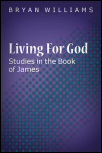
The whole Bible has a purpose, because the Spirit inspired the writing of each book. The purpose of James has vexed Christians throughout the centuries, yet its overarching purpose is to encourage, to warn, and to teach—all practical—and stresses the content of Christian living more than creed. This study of James shows that he is not an armchair theologian. He tackles issues of faith, worldview, and right living, in the context of a suspicious and skeptical age.
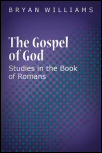
The Gospel of God: Studies in the Book of Romans
- Author: Bryan Williams
- Publisher: Logos Bible Software
- Publication Date: 2009
- Pages: 76
Romans is glorious! It is not only a part of the Bible—the finest book on earth—but in the view of many it is itself the best writing in existence. There is nothing like it. Martin Luther described Romans as “the chief book of the New Testament, and the purest Gospel.” Coleridge said it is the profoundest piece of writing in existence. Godet referred to it as the cathedral of the Christian faith. The supreme value of Romans, as Bryan Williams shows in this volume, arises from its subject, which is the righteousness of God.
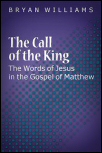
The Call of the King: The Words of Jesus in the Gospel of Matthew
- Author: Bryan Williams
- Publisher: Logos Bible Software
- Publication Date: 2009
- Pages: 71
The Call of the King is straightforward. It deals with real life. It is intended to inform and challenge readers with the word of Jesus in a format helpful both to individuals and to Bible study groups. In this volume, Williams addresses the most important questions on the book of Matthew: What did our Lord Jesus Christ say? What does he want his followers to understand? To do? Most importantly—to be? The Call of the King consists of thirty-three studies based on Jesus’ major addresses as Matthew records them. Each study begins with one or two preparatory ideas; then proceeds in a question-and-answer format.
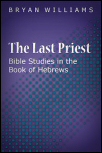
The Last Priest: Bible Studies in the Book of Hebrews
- Author: Bryan Williams
- Publisher: Logos Bible Software
- Publication Date: 2009
- Pages: 73
Hebrews brings great swaths of the Old Testament before us, so any proper study of it demands a look at the background as well as the foreground. Long ago, during the infancy of the church, God raised up remarkable men and women, and the writer of Hebrews was one of them. He apparently had a priestly background. He may have been a Levite, and perhaps a Jewish religious leader, initially resistant to Jesus and the Gospel. This Bible study offers new and fresh insights into the book of Hebrews, its background and context, and its application to today’s world.
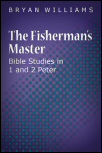
The Fisherman’s Master: Bible Studies in 1 and 2 Peter
- Author: Bryan Williams
- Publisher: Logos Bible Software
- Publication Date: 2009
- Pages: 59
The Apostle Peter has always caught the imagination. He leaps out at us from the pages of the Gospels. He demands the attention of all readers of the New Testament. But as we move from the Gospels to the Epistles, we notice a great change in Peter. He has matured! The change is very much like that which God worked in other disciples. The brash fisherman of the Gospels has become a different man.
With this in mind, it would be tempting to call Peter “The Master Fisherman.” But that’s not what Peter would have wanted. It is not Peter, whatever his character and experience may have been, who takes center stage. It is not the fisherman, but the one who called Peter and the others to be “fishers of men,” whom Peter wrote about.
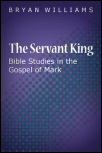
The Servant King: Bible Studies in the Gospel of Mark
- Author: Bryan Williams
- Publisher: Logos Bible Software
- Publication Date: 2009
- Pages: 83
Each of the four Gospels is distinctive. Each has its own angle concerning the Lord Jesus Christ and his life. The four perspectives in no way contradict each other, but they do complement each other like the strings and percussion and wind instruments in a band. Mark often tells us that Jesus taught, but spends less time on what he taught. The Servant King deals with Jesus’ actions, covering the whole of Mark. This insightful guide serves as an easy-to-read introduction to a fast-paced Gospel.
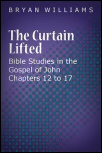
The Curtain Lifted: Bible Studies in the Gospel of John Chapters 12 to 17
- Author: Bryan Williams
- Publisher: Logos Bible Software
- Publication Date: 2009
- Pages: 53
John’s Gospel is a fascinating book. Who can forget the first memorable meeting between Jesus and some of his future disciples? Or the late-night interview with Nicodemus? Or the poignant story of the woman at the well? Or the moving account of the unexpectedly courageous man who had been born blind?
The unique block of teaching between John 12 and John 17 is suitably introduced by the supper at Bethany, the Lord’s triumphal entrance into Jerusalem, the inquiry of the Greeks, and a summary of Jewish attitudes to Jesus. It is equally appropriately followed by Jesus’ prayer in John 17. The climax of the Gospel is explained clearly and succinctly in this accessible and useful study guide.
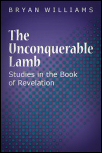
The Unconquerable Lamb: Studies in the Book of Revelation
- Author: Bryan Williams
- Publisher: Logos Bible Software
- Publication Date: 2009
- Pages: 88
Most people have never read the book of Revelation. Though they have heard of it, and perhaps wondered what it’s about, Revelation—more than any other book—has been a source of terror, bizarre fiction, and confusion.
How can Revelation help us? Naturally, more questions emerge while reading Revelation than answers, yet this accessible study guide helps navigate the complexities of the book. Understanding Revelation is not something we do alone. We need God’s help, and will profit from the help of others as we study it together.
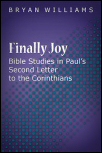
Finally Joy: Bible Studies in Paul’s Second Letter to the Corinthians
- Author: Bryan Williams
- Publisher: Logos Bible Software
- Publication Date: 2009
- Pages: 48
The words of King David describe 2 Corinthians very well: “…weeping may remain for a night, but rejoicing comes in the morning.” Paul’s second letter to the church in Corinth underscores the central fact that grief gives way to joy—finally, joy!
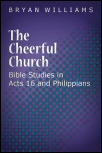
The Cheerful Church: Bible Studies in Acts 16 and Philippians
- Author: Bryan Williams
- Publisher: Logos Bible Software
- Publication Date: 2009
- Pages: 42
Those redeemed by God in Christ rejoice and set their hearts on things above, on things which please God. The book of Philippians stimulates joy—Philippians, in fact, has been called the “sunniest” of Paul’s letters. Bryan Williams’ study of Philippians helps readers understand why Philippians was among Paul’s most-loved churches, and how the joy of the Gospel is manifested in our own lives.
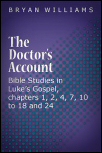
The Doctor’s Account: Bible Studies in Luke’s Gospel, Chapters 1, 2, 4, 7, 10 to 18 and 24
- Author: Bryan Williams
- Publisher: Logos Bible Software
- Publication Date: 2009
- Pages: 78
The Gospel of Luke, in common with the other Gospels, tells us about the Lord Jesus Christ. Luke records the birth of Jesus, the experiences of the shepherds, the unique event of Jesus at the temple, the parables, the cleansing of the ten lepers, and more. Then, at the end of the Gospel, we read the tender accounts of the women anointing the body of their Master, the journey on the road to Emmaus, and the beginnings of the church. Luke’s account employs drama, illustrations, and gripping narrative, and Bryan William’s study of it exposes Luke’s message for today’s church.
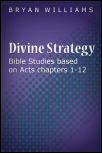
Divine Strategy: Bible Studies Based on Acts Chapters 1–12
- Author: Bryan Williams
- Publisher: Logos Bible Software
- Publication Date: 2009
- Pages: 51
There are no other books like Acts. It is indispensable. Without the book of Acts, the New Testament would have a gaping hole in its heart. The Gospels and the later parts of the New Testament would be irreparably divided. Each part would still make sense by itself, but numerous vital connections would be missing. Acts, then, is a “link” book.
But it is much more than that. In a sense, Acts provides the backdrop against which most of the epistles must be placed. It defines the “outside” of the early Christian church: the travels of the missionaries, the founding of the congregations with accompanying joys and hardships, and the connection between the infant fellowships. In Bryan Williams’ study guide on the book of Acts, readers will encounter anew the trials and triumphs of the church in Jerusalem, and document its spread throughout the Roman Empire—even to the ends of the earth.
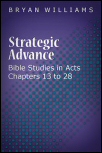
Strategic Advance: Bible Studies in Acts Chapters 13 to 28
- Author: Bryan Williams
- Publisher: Logos Bible Software
- Publication Date: 2009
- Pages: 61
In Strategic Advance the spotlight moves from the general themes of Acts to the life and work of the church’s greatest missionary—Paul. His consistent desire from the moment the heavenly bolt flashed around him on the road to Damascus was to honor Christ. He took the change in his own life to the far reaches of the Empire, making him an inspiration and example for the church in our own time.
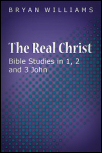
The Real Christ: Bible Studies in 1, 2 and 3 John
- Author: Bryan Williams
- Publisher: Logos Bible Software
- Publication Date: 2009
- Pages: 42
Enemies of the Gospel have always presented a false picture of the Lord Jesus. John’s opponents in the late first century were no exception. Some said Christ was a phantom, a divine agent who never really walked on earth, but was only a shadowy spirit being. To counter these people, the Apostle asserted that the Son of God became flesh: Gospel truth, but a terrible doctrine to the false teachers. In The Real Christ, Bryan Williams shows readers how the epistle of John presents Jesus as fully human and fully divine.
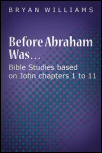
Before Abraham Was…: Bible Studies Based on John chapters 1 to 11
- Author: Bryan Williams
- Publisher: Logos Bible Software
- Publication Date: 2009
- Pages: 39
The Gospel of John inspired the makers of the creeds and confessions. Its simple, vivid, and memorable words and phrases capture the essence of the Son of God: “In the beginning was the Word, and the Word was with God, and the Word was God.” “For God so loved the world that he gave his only Son…”
In these and other verses, we find a Gospel packed with rich wisdom, deep insights, and profound theological truth about the nature and person of Jesus Christ. This study guide concentrates on John 1–11, which cover Jesus’ public ministry.
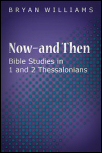
Now—and Then: Bible Studies in 1 and 2 Thessalonians
- Author: Bryan Williams
- Publisher: Logos Bible Software
- Publication Date: 2009
- Pages: 27
Thessalonica is special. It is one of the few cities in the New Testament that has not only survived, but is thriving today. Yet Thessalonica during Paul’s time found itself in a complicated spiritual position. On the one hand, the Thessalonian church was gripped in fear about death, suffering, and the End Times. On the other, they had embraced the Gospel preached to them. The title, Now—and Then speaks to this spiritual dissonance. In this study, Bryan Williams highlights the contrast between the “now” of the present age and the “then” of the Lord’s return, the climax of history.
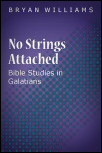
No Strings Attached: Bible Studies in Galatians
- Author: Bryan Williams
- Publisher: Logos Bible Software
- Publication Date: 2009
- Pages: 33
Paul was horrified by false religion. And many teachers of false religions returned the favor. The beliefs and practices of the enemies of the truth worked to undermine the Gospel. For the Galatians, this meant supplementing the true Gospel of Jesus with works in order for salvation to be effective. Paul’s shock and horror of this comingling makes Galatians one of his most pointed epistles. Yet it is also one of the most important, because—as Bryan Williams shows—it answers the question: “What is true salvation?”
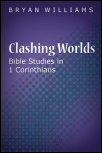
Clashing Worlds: Bible Studies in 1 Corinthians
- Author: Bryan Williams
- Publisher: Logos Bible Software
- Publication Date: 2009
- Pages: 44
The whole Bible, but particularly a book like 1 Corinthians, illustrates the titanic clash between two opposing spiritual kingdoms. Jesus taught about both the kingdom of God and the kingdom of Satan—the greatest clash the world has ever known. The book of 1 Corinthians, in particular, illustrates important facets of this cosmic clash, because the struggling saints in Corinth are caught up in the conflict between their former lifestyle and the standards of the Kingdom. Inevitably, strains appear. The clash takes various forms in the overlapping religious and cultural contexts, but the truth of the Gospel—as always—makes itself known. In these twenty-five chapters, Bryan Williams walks readers through this powerful struggle, in which good—not evil—wins.
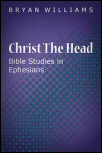
Christ the Head: Bible Studies in Ephesians
- Author: Bryan Williams
- Publisher: Logos Bible Software
- Publication Date: 2009
- Pages: 26
Christ is the head. But how? He is head over everything. He is head of the church. He is head as the heavenly husband. He is the head of the corner—“The stone the builders rejected has become the capstone…” The book of Ephesians explores Christ’s headship more than any other. This unique study guide helps readers understand the ramifications and benefits of this headship for the church, for our daily lives, and for all of history.
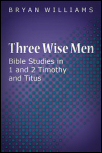
Three Wise Men: Bible Studies in 1 and 2 Timothy and Titus
- Author: Bryan Williams
- Publisher: Logos Bible Software
- Publication Date: 2009
- Pages: 39
The pastoral letters contain the teachings of three wise men. They had insight, discernment, and common sense.
Paul was wise. He was wise because he followed and preached Christ, “the wisdom of God.” Paul’s wisdom, expressed in his life and letters, has fascinated, challenged, and encouraged generations of Christians.
Timothy was also wise. His wisdom, to some degree, came from a godly pedigree and upbringing. But he was also wise because of his sincere faith.
Titus was wise, too. He had gladly accepted two tricky missions to Corinth. First, he had practically acted as a mediator between Paul and the touchy Corinthians, who had been led astray by false teachers. After that, he had been a member of a party to collect an offering for the poor in Corinth. His third task was the ministry in Crete.
Three wise men—all following God, and all influencing generations of Christians through their teaching and missionary efforts. We have much to learn from them, and Bryan Williams’ study guide helps explain their wisdom for today’s church.
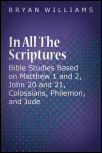
In All the Scriptures: Bible Studies Based on Matthew 1 and 2, John 20 and 21, Colossians, Philemon, and Jude
- Author: Bryan Williams
- Publisher: Logos Bible Software
- Publication Date: 2009
- Pages: 30
In All the Scriptures provides a summary and conclusion to the series. In this volume, Williams explores the broad themes which tie the New Testament together—the birth, death, and resurrection of Jesus, the friends and foes of the Gospel, and the power of the Gospel message.
About Bryan Williams
Bryan Williams was born and raised in Nelson, New Zealand. In 1958, he moved to England to attend London Bible College. In 1962, Williams gained a B.D. from the University of London and an ALBC diploma from London Bible College. At the invitation of the Bible Institute of South Africa, he began lecturing there in 1970, and held various positions there. In 1977, he completed his Ph.D. through the Universities of Cape Town and Stellenbosch. For years, he has led home Bible studies and served in various church committees. He has written numerous books, and has devoted his life to developing tools to help people study the Bible more fruitfully. Bryan and his wife, Barbara, live in Cape Town, South Africa.